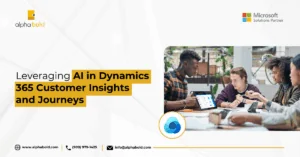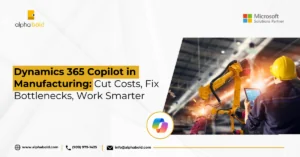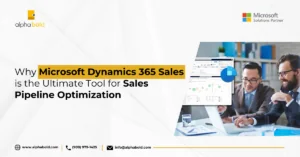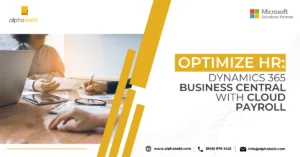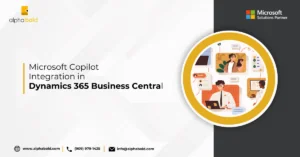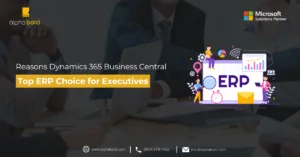What Microsoft’s End of Support for Dynamics GP Means for Your Business

Caroline Mayou
Introduction
As a decision-maker, Microsoft’s recent announcement about Microsoft Dynamics GP end of life by September 30, 2029, marks a critical turning point. No leader likes hearing that a trusted system they’ve relied on for decades is being sunset, but this shift forces a necessary reflection on the future.
This isn’t just about the end of product enhancements and service packs; it’s about understanding how this move affects your business in terms of strategy, security, and scalability. With security updates ending in 2031, staying on GP indefinitely isn’t an option, but planning a transition now gives you the opportunity to look beyond the short-term fixes. You’ll need to assess: how does this transition impact your organization’s ability to grow, innovate, and remain competitive? How can you minimize operational disruption while preparing for the future?
What’s most important here is that this isn’t just a technical shift; it’s an opportunity to consider broader business transformation. Decisions made now will shape how your team works in the coming decade. Moving away from Dynamics GP can unlock new capabilities that align better with where technology and markets are headed. Dynamics 365 Business Central, for example, offers a modern, cloud-first architecture with advanced AI and security features, giving your team tools to stay agile and responsive.
This transition needs to be viewed not as a reaction to Microsoft’s decision but as a proactive move toward a system that supports smarter decision-making, better data visibility, and enhanced operational efficiency in light of the Microsoft Dynamics GP end of life. Your business’s future agility depends on the choices you make now. Let’s dive deeper into what this all means and how your business can best navigate this change.
Key Dates for Microsoft Dynamics GP End of Life
Understanding the timeline for Microsoft Dynamics GP’s end of support is essential for planning your business’s transition. Here are the critical dates:
- April 1, 2025: No new perpetual licenses will be sold. This means no new businesses can purchase Dynamics GP on a perpetual basis.
- April 1, 2026: No new subscription licenses will be available.
- September 30, 2029: End of product enhancements, service packs, and technical support.
- April 30, 2031: End of security updates, signaling the complete termination of support for Dynamics GP.

Each of these dates reflects a key shift in the availability and sustainability of the system. If you rely on Dynamics GP for critical operations, this timeline underscores the urgency of assessing your next move. The discontinuation of security updates by April 2031 should be a clear indicator that continued use beyond this date presents significant risks, including exposure to potential cybersecurity threats and compliance issues.
Rather than waiting until the final hour, businesses should start laying the groundwork for an alternative ERP solution now, especially with the Microsoft Dynamics GP end of life approaching. Early action will allow for a smoother transition with less disruption to your day-to-day operations.
Further Reading: Microsoft Copilot Integration in Dynamics 365 Business Central
Why Microsoft is Discontinuing GP
Microsoft’s decision to phase out Dynamics GP is primarily driven by its significant investment in cloud-based solutions, particularly Dynamics 365 Business Central and Dynamics 365 Finance. The shift reflects a broader move toward embracing advancements in cloud technology, artificial intelligence (AI), and enhanced security features that these newer platforms provide.
“The cloud offers unprecedented flexibility, scalability, and security—qualities that traditional on-premise systems like Dynamics GP simply can’t match, especially as the Microsoft Dynamics GP end of life draws near. In this digital age, businesses are demanding more intelligent, integrated systems that can adapt quickly to evolving needs and threats. Cloud-based ERP solutions address these challenges by offering robust AI capabilities to streamline decision-making, enhanced security protocols to protect against growing cyber threats, and continual updates that keep the system innovative and agile.”
By encouraging businesses to transition to Dynamics 365 Business Central or Finance, Microsoft is aligning with the future of enterprise resource planning (ERP): one that is cloud-native and infused with AI to help businesses work smarter and more efficiently. The decision to sunset Dynamics GP is a reflection of this larger strategic shift, urging businesses to embrace a future that promises stronger, more secure, and far more adaptable systems for driving business growth.
How the End of Support for Microsoft Dynamics GP Affects Current Users: ERP Strategy and Migration Opportunities
For businesses still operating on Microsoft Dynamics GP, this transition marks a pivotal moment. Companies now face the necessity of evaluating their ERP strategy and planning for the future. The decision to end support for GP isn’t just about winding down—it’s a signal for businesses to explore newer, more advanced solutions.
Fortunately, Microsoft is providing a window of opportunity: current users can take advantage of discounts and migration support for transitioning to Dynamics 365 Business Central. By planning early, organizations can mitigate disruption and strategically upgrade to a cloud-based ERP that offers enhanced features, AI capabilities, and stronger security.
This is an ideal moment to reassess how your ERP aligns with long-term goals. With proper planning, the migration offers a chance to modernize operations, improve efficiencies, and stay ahead of the curve in a rapidly changing technological landscape.
Options for Transitioning
As businesses prepare for the Microsoft Dynamics GP end of life, AlphaBOLD offers an ERP Assessment to help organizations identify the best-fit solution for their specific needs. This comprehensive service evaluates which ERP aligns better with your business objectives and processes. AlphaBOLD provides strategic support for developing a migration roadmap, ensuring a smooth and effective transition to your next ERP solution, minimizing disruptions, and maximizing long-term value for your business.
Ready to Future Proof Your ERP System?
With the end of support for your current ERP on the horizon, it's crucial to explore all available options to ensure your business remains efficient and competitive. AlphaBOLD's ERP Assessment provides a comprehensive, software-agnostic evaluation tailored to your unique needs. Whether you're looking to enhance your current system or explore new solutions, our expert team will guide you through every step of the process—helping you make informed decisions for long-term success.
Schedule Your ERP AssessmentCloud ERP Migration Benefits
Transitioning to a modern ERP system offers a range of transformative benefits that can improve both day-to-day operations and long-term growth potential.
- Advanced Automation & AI: Modern ERP platforms incorporate cutting-edge automation and AI features, which streamline processes, reduce manual input, and enhance accuracy. AI-powered insights allow businesses to make more informed decisions by analyzing vast amounts of real-time data.
- Operational Efficiency: With cloud-based ERP systems, businesses can centralize data and processes across departments, enabling real-time collaboration. This accessibility improves communication, speeds up workflows, and reduces the time spent tracking down information, ultimately increasing productivity. These systems are scalable and adapt to growing business needs without the burdens of managing on-premise infrastructure.
- Security & Innovation: New ERP platforms come with frequent updates, ensuring that your system benefits from the latest security features and innovations. With improved encryption and proactive security monitoring, these systems protect sensitive data from external threats. Additionally, regular software updates mean that your ERP is always equipped with the latest tools and features, giving you a competitive edge.
- Integration Capabilities: Modern ERP systems integrate seamlessly with other key business applications, such as CRM, supply chain management, and marketing automation platforms. This interconnectedness ensures that all business functions are aligned and that data flows smoothly between different systems, reducing silos and improving overall visibility.
- Cloud Flexibility: Cloud-based ERPs offer flexibility in terms of access and scalability. Your workforce can access critical business data from anywhere, supporting remote work and global operations. Additionally, the cloud offers cost-saving opportunities, as it reduces the need for extensive on-premise hardware and maintenance.
- Customer & Supplier Relationships: By consolidating information across various touchpoints, new ERP systems improve visibility into customer and supplier interactions. This enables businesses to provide better service, manage orders more efficiently, and address issues proactively.
Ultimately, migrating to a new ERP solution in light of the Microsoft Dynamics GP end of life means equipping your business with tools to not only manage today’s challenges but also thrive in a rapidly evolving, tech-driven marketplace.
Further Reading: Microsoft Dual-write for Integrating ERP and CRM Systems
Next Steps for Businesses Getting Off Dynamics GP
Taking proactive steps now is critical to ensure a smooth ERP transition and avoid disruption to business operations as the Microsoft Dynamics GP end of life approaches. Evaluating your ERP options early will give your business ample time to select the right solution and build a comprehensive migration plan.
At AlphaBOLD, we specialize in facilitating seamless ERP transitions. We guide you through the entire process, from understanding your current systems to mapping out a tailored migration strategy. With our expertise, businesses can confidently transition to a modern ERP that aligns with their goals and future needs.
Explore Recent Blog Posts


